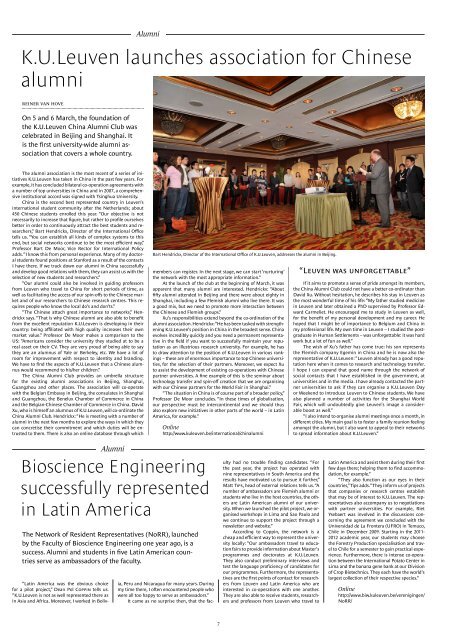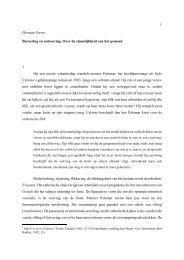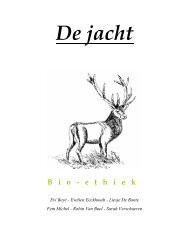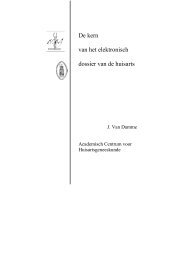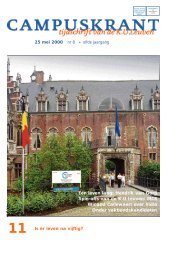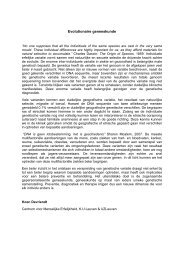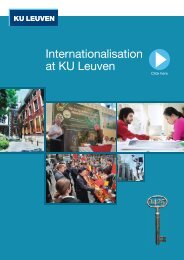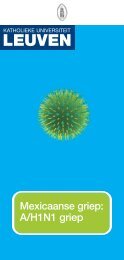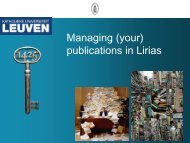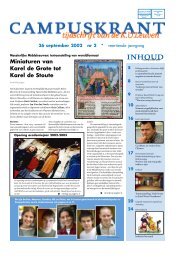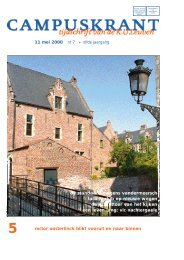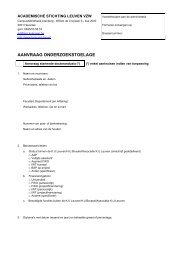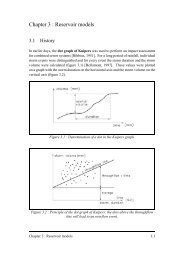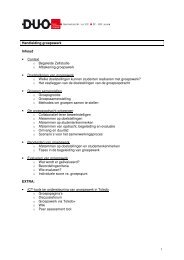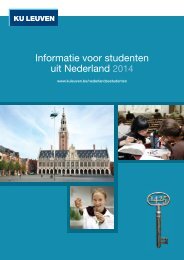MIND SPELLER - KU Leuven
MIND SPELLER - KU Leuven
MIND SPELLER - KU Leuven
You also want an ePaper? Increase the reach of your titles
YUMPU automatically turns print PDFs into web optimized ePapers that Google loves.
Alumni<br />
K.U.<strong>Leuven</strong> launches association for Chinese<br />
alumni<br />
Reiner Van Hove<br />
On 5 and 6 March, the foundation of<br />
the K.U.<strong>Leuven</strong> China Alumni Club was<br />
celebrated in Beijing and Shanghai. It<br />
is the first university-wide alumni association<br />
that covers a whole country.<br />
The alumni association is the most recent of a series of initiatives<br />
K.U.<strong>Leuven</strong> has taken in China in the past few years. For<br />
example, it has concluded bilateral co-operation agreements with<br />
a number of top universities in China and in 2007, a comprehensive<br />
institutional accord was signed with Tsinghua University.<br />
China is the second best represented country in <strong>Leuven</strong>’s<br />
international student community after the Netherlands; about<br />
450 Chinese students enrolled this year. “Our objective is not<br />
necessarily to increase that figure, but rather to profile ourselves<br />
better in order to continuously attract the best students and researchers,”<br />
Bart Hendrickx, Director of the International Office<br />
tells us. “You can establish all kinds of complex systems to this<br />
end, but social networks continue to be the most efficient way,”<br />
Professor Bart De Moor, Vice Rector for International Policy<br />
adds. “I know this from personal experience. Many of my doctoral<br />
students found positions at Stanford as a result of the contacts<br />
I have there. If we track down our alumni in China successfully<br />
and develop good relations with them, they can assist us with the<br />
selection of new students and researchers.”<br />
“Our alumni could also be involved in guiding professors<br />
from <strong>Leuven</strong> who travel to China for short periods of time, as<br />
well as facilitating the access of our spin-offs to the Chinese market<br />
and of our researchers to Chinese research centres. This requires<br />
people who know the local do’s and don’ts.”<br />
“The Chinese attach great importance to networks,” Hendrickx<br />
says. “That is why Chinese alumni are also able to benefit<br />
from the excellent reputation K.U.<strong>Leuven</strong> is developing in their<br />
country: being affiliated with high quality increases their own<br />
market value.” Professor De Moor makes a comparison to the<br />
US: “Americans consider the university they studied at to be a<br />
real asset on their CV. They are very proud of being able to say<br />
they are an alumnus of Yale or Berkeley, etc. We have a lot of<br />
room for improvement with respect to identity and branding.<br />
We have to find the aspects of K.U.<strong>Leuven</strong> that a Chinese alumnus<br />
would recommend to his/her children.”<br />
The China Alumni Club provides an umbrella structure<br />
for the existing alumni associations in Beijing, Shanghai,<br />
Guangzhou and other places. The association will co-operate<br />
with the Belgian Embassy in Beijing, the consulates in Shanghai<br />
and Guangzhou, the Benelux Chamber of Commerce in China<br />
and the Belgian-Chinese Chamber of Commerce in China. David<br />
Xu, who is himself an alumnus of K.U.<strong>Leuven</strong>, will co-ordinate the<br />
China Alumni Club. Hendrickx: “He is meeting with a number of<br />
alumni in the next few months to explore the ways in which they<br />
can concretise their commitment and which duties will be entrusted<br />
to them. There is also an online database through which<br />
Bart Hendrickx, Director of the International Office of K.U.<strong>Leuven</strong>, addresses the alumni in Beijing.<br />
members can register. In the next stage, we can start ‘nurturing’<br />
the network with the most appropriate information.”<br />
At the launch of the club at the beginning of March, it was<br />
apparent that many alumni are interested. Hendrickx: “About<br />
fifty alumni attended in Beijing and there were about eighty in<br />
Shanghai, including a few Flemish alumni who live there. It was<br />
a good mix, but we need to promote more interaction between<br />
the Chinese and Flemish groups.”<br />
Xu’s responsibilities extend beyond the co-ordination of the<br />
alumni association. Hendrickx: “He has been tasked with strengthening<br />
K.U.<strong>Leuven</strong>’s position in China in the broadest sense. China<br />
evolves incredibly quickly and you need a permanent representative<br />
in the field if you want to successfully maintain your reputation<br />
as an illustrious research university. For example, he has<br />
to draw attention to the position of K.U.<strong>Leuven</strong> in various rankings<br />
– these are of enormous importance to top Chinese universities,<br />
for the selection of their partners. Moreover, we expect Xu<br />
to assist the development of existing co-operations with Chinese<br />
partner universities. A fine example of this is the seminar about<br />
technology transfer and spin-off creation that we are organising<br />
with our Chinese partners for the World Fair in Shanghai.”<br />
“The situation in China is of course part of a broader policy,”<br />
Professor De Moor concludes. “In these times of globalisation,<br />
our perspective must be intercontinental and we should thus<br />
also explore new initiatives in other parts of the world – in Latin<br />
America, for example.”<br />
Online<br />
http://www.kuleuven.be/international/chinalumni<br />
“<strong>Leuven</strong> was unforgettable”<br />
If it aims to promote a sense of pride amongst its members,<br />
the China Alumni Club could not have a better co-ordinator than<br />
David Xu. Without hesitation, he describes his stay in <strong>Leuven</strong> as<br />
the most wonderful time of his life: “My father studied medicine<br />
in <strong>Leuven</strong> and later obtained a PhD supervised by Professor Edward<br />
Carmeliet. He encouraged me to study in <strong>Leuven</strong> as well,<br />
for the benefit of my personal development and my career. He<br />
hoped that I might be of importance to Belgium and China in<br />
my professional life. My own time in <strong>Leuven</strong> – I studied the postgraduate<br />
in Human Settlements – was unforgettable: it was hard<br />
work but a lot of fun as well.”<br />
The wish of Xu’s father has come true: his son represents<br />
the Flemish company Egemin in China and he is now also the<br />
representative of K.U.<strong>Leuven</strong>: “<strong>Leuven</strong> already has a good reputation<br />
here when it comes to research and technology transfer.<br />
I hope I can expand that good name through the network of<br />
social contacts that I have established in the government, at<br />
universities and in the media. I have already contacted the partner<br />
universities to ask if they can organise a K.U.<strong>Leuven</strong> Day<br />
or Weekend to introduce <strong>Leuven</strong> to Chinese students. We have<br />
also planned a number of activities for the Shanghai World<br />
Fair, which will undoubtedly give <strong>Leuven</strong>’s image a considerable<br />
boost as well.”<br />
“I also intend to organise alumni meetings once a month, in<br />
different cities. My main goal is to foster a family reunion feeling<br />
amongst the alumni, but I also want to appeal to their networks<br />
to spread information about K.U.<strong>Leuven</strong>.”<br />
Alumni<br />
Bioscience Engineering<br />
successfully represented<br />
in Latin America<br />
The Network of Resident Representatives (NoRR), launched<br />
by the Faculty of Bioscience Engineering one year ago, is a<br />
success. Alumni and students in five Latin American countries<br />
serve as ambassadors of the faculty.<br />
“Latin America was the obvious choice<br />
for a pilot project,” Dean Pol Coppin tells us.<br />
“K.U.<strong>Leuven</strong> is not as well represented there as<br />
in Asia and Africa. Moreover, I worked in Bolivia,<br />
Peru and Nicaragua for many years. During<br />
my time there, I often encountered people who<br />
were all too happy to serve as ambassadors.”<br />
It came as no surprise then, that the faculty<br />
had no trouble finding candidates. “For<br />
the past year, the project has operated with<br />
nine representatives in South America and the<br />
results have motivated us to pursue it further,”<br />
Matt Tips, head of external relations tells us. “A<br />
number of ambassadors are Flemish alumni or<br />
students who live in the host countries, the others<br />
are Latin American alumni of our university.<br />
When we launched the pilot project, we organised<br />
workshops in Lima and Sao Paulo and<br />
we continue to support the project through a<br />
newsletter and website.”<br />
According to Coppin, the network is a<br />
cheap and efficient way to represent the university<br />
locally: “Our ambassadors travel to education<br />
fairs to provide information about Master’s<br />
programmes and doctorates at K.U.<strong>Leuven</strong>.<br />
They also conduct preliminary interviews and<br />
test the language proficiency of candidates for<br />
our programmes. Furthermore, the representatives<br />
are the first points of contact for researchers<br />
from <strong>Leuven</strong> and Latin America who are<br />
interested in co-operations with one another.<br />
They are also able to receive students, researchers<br />
and professors from <strong>Leuven</strong> who travel to<br />
Latin America and assist them during their first<br />
few days there; helping them to find accommodation,<br />
for example.”<br />
“They also function as our eyes in their<br />
countries,” Tips adds. “They inform us of projects<br />
that companies or research centres establish<br />
that may be of interest to K.U.<strong>Leuven</strong>. The representatives<br />
also accompany us to negotiations<br />
with partner universities. For example, Riet<br />
Ysebaert was involved in the discussions concerning<br />
the agreement we concluded with the<br />
Universidad de La Frontera (UFRO) in Temuco,<br />
Chile in December 2009. Starting in the 2011-<br />
2012 academic year, our students may choose<br />
the Forestry Production specialisation and travel<br />
to Chile for a semester to gain practical experience.<br />
Furthermore, there is intense co-operation<br />
between the International Potato Center in<br />
Lima and the banana gene bank at our Division<br />
of Crop Biotechnics. They each have the world’s<br />
largest collection of their respective species.”<br />
Online<br />
http://www.biw.kuleuven.be/verenigingen/<br />
NoRR/<br />
7


